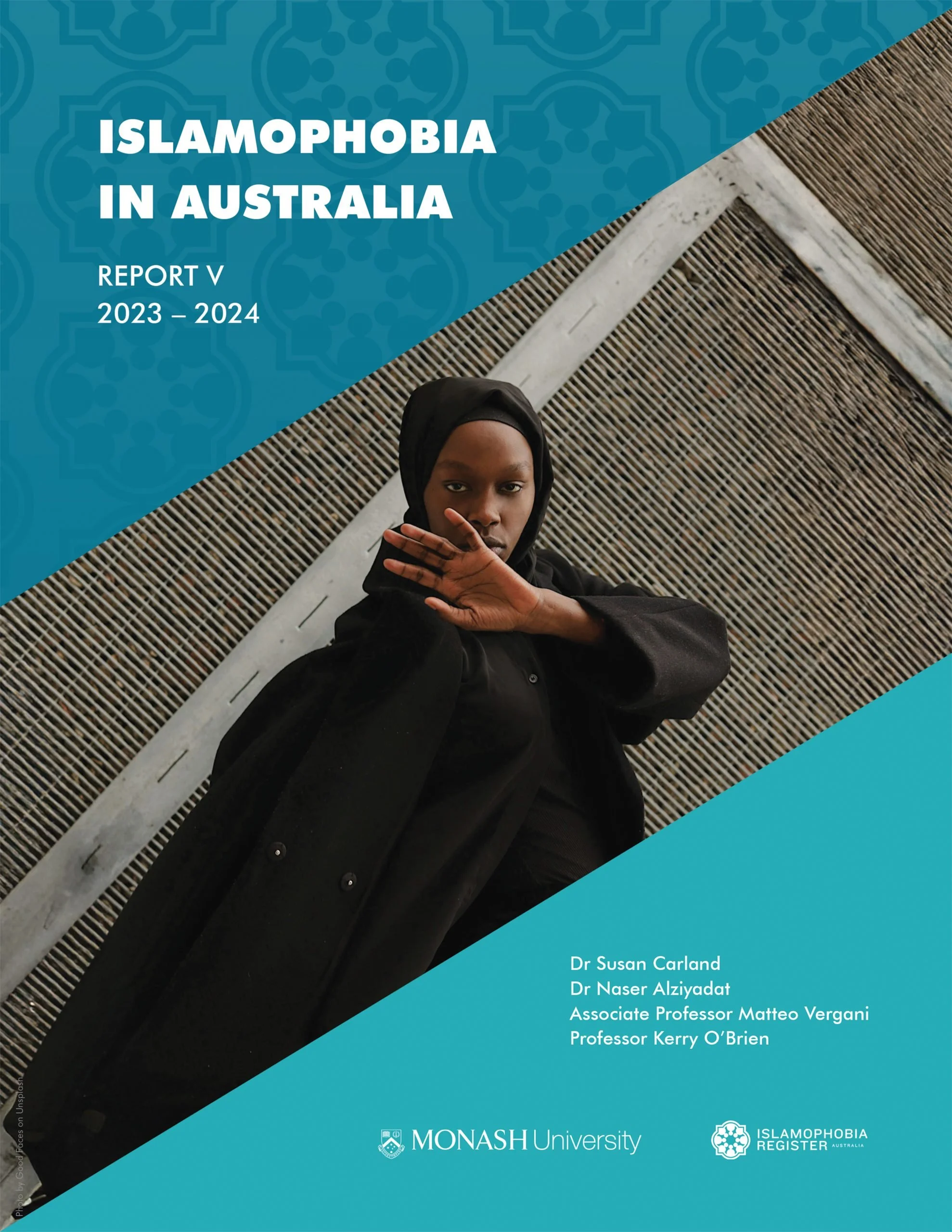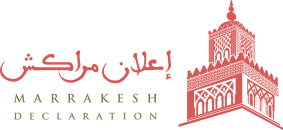ADDRESSING ISLAMOPHOBIA:
RESOURCES
Prejudice towards Muslims is often the result of ignorance, therefore resources that provide sound information about Islam and interreligious relations are an important aspect of dismantling prejudicial stereotypes and countering misinformation.
This webpage lists such resources. There are two parts - a section that focuses on initiatives that track and address Islamophobia, and a second section that addresses social cohesion more broadly.
ISLAMOPHOBIA IN AUSTRALIA - REPORT
In 2015, the Islamophobia Register Australia was launched, in order to help track and address Islamophobia. On 13 March 2025 its fifth report was released, presented by Dr Susan Carland.
Disturbingly, Islamophobia in Australia is escalating at an alarming rate. It is also highly gendered – 75% of people verbally abused and assaulted for being Muslim are women and girls. It documents the daily verbal abuse, physical assaults, and discrimination faced by Muslims in Australia, painting a concerning picture of the current social climate. The report urges communities, policymakers, and individuals to address and combat this escalating issue. It underscores the importance of solidarity and proactive measures to foster inclusivity and counter hate-driven attitudes in Australian society. For a sobering view of the attacks and discrimination many of our Muslim sisters and brothers experience daily, read the Islamophobia In Australia report by clicking here. (Source: Bridges, No. 107, June 2025, p.8)
ACTION AGAINST ISLAMOPHOBIA
Action Against Islamophobia (AAI) is an initiative of the Australian National Imams Council (ANIC), aimed at providing confidential crisis support for anyone who has experienced Islamophobia, anti-Muslim hate, racism, discrimination, bias, or bigotry. Additionally, AAI delivers information on what resources are available to support those affected, in schools, in the workplace, as well as referrals to legal and mental health services.
Learn more about these resources at AAI webpage.
Jesuitical Podcast
What Catholics can do to fight Islamophobia
In 2021, The Jesuit media agency America shared this conversation as part of its Jesuitical Podcast about what we can do to combat anti-Muslim bias in ourselves and in our communities, with Jordan Denari Duffner. Jordan is a scholar of Muslim-Christian relations.
CANADIAN GUIDE
The Canadian Guide to Understanding and Combatting Islamophobia for a more inclusive Canada
(Office of the Special Representative on Combatting Islamophobia, 2024)
“Islamophobia challenges safety and well-being, undermines social cohesion and threatens our democratic values. It spans a broad spectrum of behaviours—from bias and discrimination to racism and hate—and can be experienced in workplaces, schools, public settings and throughout all facets of society … . This new Guide is meant for everyone: educators, employers, administrators, decision makers, journalists, lawyers, judges, law enforcement, students and community leaders. In short, it is for all Canadians who seek to combat Islamophobia … . The Guide is organized around three overarching themes. First, it presents a conceptual understanding of Islamophobia, offering a detailed definition, key drivers, and examples of its manifestations. Second, the Guide examines the impacts of Islamophobia on diverse communities. The last chapter presents practical strategies for individuals and organizations to prevent and combat Islamophobia to actively contribute to an inclusive society.” (Source: see the Canadian Guide, pp. 6,9]
STRENGTHENING SOCIAL COHESION:
ORGANISATIONS
COLUMBAN CENTRE FOR CHRISTIAN-MUSLIM RELATIONS
The Columban Centre for Christian-Muslim Relations is an initiative of St Columban’s Mission Society. Through this Centre, the Columbans and their associates promote and practice the Catholic Church’s teaching on interreligious dialogue and have been building mutual understanding between Christians and Muslims since 1997. They attend Muslim talks, conferences, and feast day and other community occasions. They (co-)host Christian-Muslim and multifaith events, organise opportunities for people of different faiths to meet together, give talks and workshops on Islam, Christian-Muslim Relations and interfaith dialogue. Their quarterly newsletter, Bridges, provides news and feature articles on Islam, Christian-Muslim relations and interfaith dialogue. The Interfaith e-Bulletin provides news about Columban engagement in interfaith action from around the world. They also have a strong presence on social media. For further information, visit the Centre’s webpage.
INTERFAITH ENCOUNTERS
Catholic Mission’s Interfaith Encounters program has successfully brought together Catholic and Muslim students for a period of learning and exchange between their respective schools. This program “provides a practical component to the study of religion, enhancing understanding of cultural and religious diversity and building confidence in standing against discrimination. The program provides the platform for students and staff to develop new friendships, celebrate difference, deepen faith, and promote peace and social cohesion.” (Source: Catholic Mission)
Learn more at the Interfaith Encounters webpage.
TOGETHER FOR HUMANITY
Together For Humanity (TFH) is an inclusive educational organisation that works with school communities to foster intercultural understanding and help students learn how to deal with differences. TFH stands for acceptance of every person regardless of ethnicity or faith. Its offerings include free in person programs and presentations for students and teachers, as well as self-paced online modules which can be found on its online learning portal. Learn more at: https://togetherforhumanity.org.au/
THE ABRAHAM CONFERENCE
The Abraham Conference is a Sydney-based initiative, that brings together members of the Abrahamic traditions for a gathering of input on topics of contemporary interest. In June 2025 it hosted a prayer service for peace in the Middle East at St Stephen’s Uniting Church in Sydney.
THE CHARTER OF MAKKAH
The Makkah Declaration (2019) also known as The Charter of Makkah, is a document that was endorsed on 28 May 2019 in Makkah, Saudi Arabia, under the auspices of the Muslim World League. It outlines Islamic and humanitarian values of coexistence and envisages a world of interreligious cooperation, respect for all nations and for the dignity of all.
Download the document at the website of the Muslim World League.
THE MARRAKESH DECLARATION
The Marrakesh Declaration is a statement released in 2016 at a meeting of Muslim leaders from 100+ countries around the world, sponsored by the Moroccan government and the Forum for Promoting Peace in Muslim Societies. It is a response to the problem of violent persecution of minorities in Muslim-majority countries and a powerful summons from within the Muslim world for human rights to be upheld and
minorities to be protected.
A COMMON WORD
A Common Word Between Us and You is a landmark open letter issued in 2007 by 138 Muslim scholars and leaders to Christian counterparts worldwide. Rooted in the shared spiritual principles of Islam and Christianity, the document calls for unity and peace based on two foundational commandments: love of God and love of neighbour. Drawing from both the Qur’an and the Bible, it emphasises that these values form a profound common ground between the two faiths. The initiative seeks to foster mutual respect, dialogue, and cooperation, highlighting that peaceful coexistence between Muslims and Christians—who together comprise over half of the global population—is essential for global harmony. By inviting Christians to reflect on shared beliefs and ethical commitments, the letter aims to bridge divides and promote a future built on understanding and compassion. Click here to access the document.











